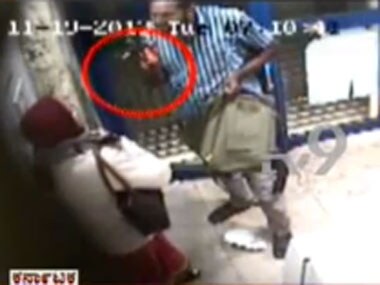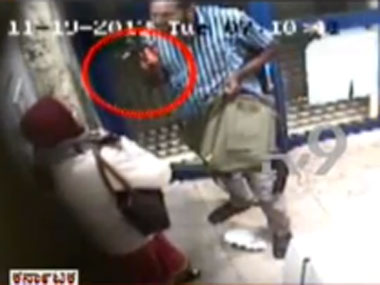A senior bank official is attacked inside an ATM in the heart of Bangalore at the most civilized hour of 7 AM. The incident as seen on TV screen was so gory that many viewers may not have recovered yet, more than 24 hours after it had occurred. It also debunks the notion that a CCTV is the best deterrence against intruders. It often turns out to be nothing more than a post-incident facilitator for identifying the offender, who is sometimes so clever that he masks himself too well that his identity can hardly be fixed. Actress Shruti Hassan is stalked right at her doorsteps in the fashionable Mumbai, a city which was once upon a time regarded as safe and friendly to all citizens. Both happenings on a day when, for the first time, an all-women’s bank is inaugurated at the nation’s capital! What an irony! The unique new bank is no doubt welcome from a gender perspective, but is very much likely to be regarded nothing more than tokenism, in a country that is becoming increasingly unsafe for both the woman citizen and international visitor. [caption id=“attachment_1239935” align=“alignleft” width=“380”]
 Screengrab of the CCTV footage from the ATM in which the woman was attacked.[/caption] Now we have the candid and an eminently credible statement by Nancy Powell, the US Ambassador to India, that the substantial drop in American students coming to our country can be attributed to a fear of rape. There cannot be a greater indictment of the Indian male, who is perhaps already being seen across the globe as a predatory animal looking all the time for his prey, wherever he is perched. Our reputation for protecting women, which suffered a nose dive after Nirbhaya, has now reached its nadir. I am afraid, instead of getting better; the scene has got worse since Nirbhaya. It is easy to be smug saying that other countries have also the same problem of protecting their women, and hence there is no need to be excited about it. This is poor comfort. A cavalier attitude to a critical social malaise is both despicable and condemnable. I welcome the US Ambassador’s candid view of our country. We need many more diplomats to say this with even more eloquence so that there is at least a chance of generating some enlightenment and a spark of action that would make our women feel more secure. Women activists have no doubt brought about a greater public awareness of the issues involved. They have been responsible for making the laws a tad more stringent. Their no-holds-barred attack on police insensitivity have also made the top brass of the police sit up and listen to them. What has been the result? There are only specious claims that the cutting edge of the police is a lot more sensitive to atrocities on women than before. There is no evidence of this on the ground. Naturally, whenever incidents of the kind reported yesterday from Bangalore and Mumbai happen, they drive us to believe that the situation has hardly changed. This is however no time for finger pointing or pompous statements assuring a zero tolerance of crimes against women. Neither assuages the feelings of the average Indian woman. It is facile to believe that there can be a zero crime situation. Let us face it. Attacks on women and children will unfortunately continue to occur, perhaps with greater frequency and vehemence, despite all possible efforts by an alert police force (if ever we can transform the present excessively politicized, corrupt and slothful force) and a security-conscious citizenry. This is not being cynical but only being realistic. How then can we react to events like Mumbai and Bangalore? The best bet is a meaningful partnership between the police and women activists, aided by conscientious men and women at the top of law enforcement and society. Under the present dispensation, both have their own egos and a bitter mutual distrust. This is where the higher echelons of government can step in and play a coordinating role. We need to institutionalize an arrangement, whereby there is a forum at which views are exchanged, and there is a genuine effort to plug loopholes in existing security arrangements. Swift and clear communication of trends of crime in a locality is most essential. I know of cities in the US where crime maps indicating ‘hot spots’ which are notorious for frequency of crime are put on the net, and citizens can accordingly regulate their movements. This is yet to catch on in India. Let us also remember that a large majority of Indians are not yet computer-savvy. A crime map is therefore of limited utility in the Indian context. A generous use of the social media may however help. Ultimately, there can be no substitute for self-defensive and preventive measures on the part of women. ‘Target hardening’ is the fashionable jargon, which highlights the need for making commission of a crime very difficult. Either potential victims do this, or the government initiates measures in this direction. This is at best common sense. These are days of private security agencies and gated communities which offer more than a semblance of security. Don’t we lock up our houses and set the burglar alarm on when we leave our homes? Don’t we opt for a bank locker to keep our precious jewels away from criminals? By the same token, is it not advisable for women and children to avoid areas which are poorly lit and have also a reputation for being crime-prone? I can go on and on adding to the list of measures that enhance our safety. While we certainly have a right to demand a more alert and accountable police and also punish cops found to be lax and negligent, let us stop depending solely on government and its agencies for our full-fledged protection. Many of you may consider such advice as sanctimonious and unacceptable. I do not however see any way out of a difficult situation that shows all signs of deteriorating in the next few years. (The writer is a former CBI Director.)
Screengrab of the CCTV footage from the ATM in which the woman was attacked.[/caption] Now we have the candid and an eminently credible statement by Nancy Powell, the US Ambassador to India, that the substantial drop in American students coming to our country can be attributed to a fear of rape. There cannot be a greater indictment of the Indian male, who is perhaps already being seen across the globe as a predatory animal looking all the time for his prey, wherever he is perched. Our reputation for protecting women, which suffered a nose dive after Nirbhaya, has now reached its nadir. I am afraid, instead of getting better; the scene has got worse since Nirbhaya. It is easy to be smug saying that other countries have also the same problem of protecting their women, and hence there is no need to be excited about it. This is poor comfort. A cavalier attitude to a critical social malaise is both despicable and condemnable. I welcome the US Ambassador’s candid view of our country. We need many more diplomats to say this with even more eloquence so that there is at least a chance of generating some enlightenment and a spark of action that would make our women feel more secure. Women activists have no doubt brought about a greater public awareness of the issues involved. They have been responsible for making the laws a tad more stringent. Their no-holds-barred attack on police insensitivity have also made the top brass of the police sit up and listen to them. What has been the result? There are only specious claims that the cutting edge of the police is a lot more sensitive to atrocities on women than before. There is no evidence of this on the ground. Naturally, whenever incidents of the kind reported yesterday from Bangalore and Mumbai happen, they drive us to believe that the situation has hardly changed. This is however no time for finger pointing or pompous statements assuring a zero tolerance of crimes against women. Neither assuages the feelings of the average Indian woman. It is facile to believe that there can be a zero crime situation. Let us face it. Attacks on women and children will unfortunately continue to occur, perhaps with greater frequency and vehemence, despite all possible efforts by an alert police force (if ever we can transform the present excessively politicized, corrupt and slothful force) and a security-conscious citizenry. This is not being cynical but only being realistic. How then can we react to events like Mumbai and Bangalore? The best bet is a meaningful partnership between the police and women activists, aided by conscientious men and women at the top of law enforcement and society. Under the present dispensation, both have their own egos and a bitter mutual distrust. This is where the higher echelons of government can step in and play a coordinating role. We need to institutionalize an arrangement, whereby there is a forum at which views are exchanged, and there is a genuine effort to plug loopholes in existing security arrangements. Swift and clear communication of trends of crime in a locality is most essential. I know of cities in the US where crime maps indicating ‘hot spots’ which are notorious for frequency of crime are put on the net, and citizens can accordingly regulate their movements. This is yet to catch on in India. Let us also remember that a large majority of Indians are not yet computer-savvy. A crime map is therefore of limited utility in the Indian context. A generous use of the social media may however help. Ultimately, there can be no substitute for self-defensive and preventive measures on the part of women. ‘Target hardening’ is the fashionable jargon, which highlights the need for making commission of a crime very difficult. Either potential victims do this, or the government initiates measures in this direction. This is at best common sense. These are days of private security agencies and gated communities which offer more than a semblance of security. Don’t we lock up our houses and set the burglar alarm on when we leave our homes? Don’t we opt for a bank locker to keep our precious jewels away from criminals? By the same token, is it not advisable for women and children to avoid areas which are poorly lit and have also a reputation for being crime-prone? I can go on and on adding to the list of measures that enhance our safety. While we certainly have a right to demand a more alert and accountable police and also punish cops found to be lax and negligent, let us stop depending solely on government and its agencies for our full-fledged protection. Many of you may consider such advice as sanctimonious and unacceptable. I do not however see any way out of a difficult situation that shows all signs of deteriorating in the next few years. (The writer is a former CBI Director.)
RK Raghavan is a former director of Central Bureau of Investigation and a former joint director of the Intelligence Bureau, New Delhi
)